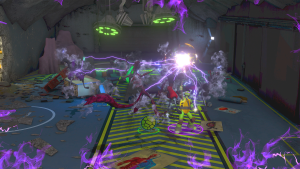Please support Game Informer. Print magazine subscriptions are less than $2 per issue
Why Dishonored 2’s Selectable Protagonists Are Secretly Its Greatest Asset

Heads up, friends: spoilers for the original Dishonored (but no major spoilers for Dishonored 2) lie ahead.
Dishonored 2 has been out for almost two months now and in that time received a great deal of (earned) praise for its gameplay systems, story, and dark world. However, one quality of the game I’ve noticed not get its due is developer Arkane’s decision to let you choose to play as either Corvo, the protagonist from the original Dishonored, or his daughter, Empress Emily Kaldwin. And so I wanted to spend some words talking about why I think letting players have that choice between these characters isn’t just a “oh neat” but instead a brilliant design decision that feels like an integral evolution of the series’ choice-oriented design. But to get there, we need to talk about how and why the original Dishonored works so well. Let's dive into it.
It’s probably best to think about games that hinge on choice, like Dishonored and Mass Effect, in terms of constants and variables. In the original Dishonored, there are a series of events that the player cannot change at all. Empress Jessamine will always die by Daud’s hand. Corvo will be framed for the assassination. He will escape from prison and be given powers by The Outsider, “a figure from myth who is neither good nor evil.” It’s understandable why these things cannot be changed: they’re part of the setup. However, everything else that the player’s choices affect are the variables and what makes Dishonored so special is that it has a lot of meaningful variables in such a tiny space.
Consider Mass Effect, probably the end-all “Your Choices Matter” game series, right? Among those three games are around 90 hours' worth of choices that Bioware has to convince you matter within its grand, interactive sci-fi opera. Dishonored works a smaller but potent bit of that same magic within 12 hours because the variables allow us to choose who Corvo Attano is and who he is shaped not by Telltale-style conversation wheel prompts but instead our continual interactions with the world he inhabits.
A couple of years ago I wrote about why I believe Dishonored is the best Batman game ever made for Paste and while you may disagree with me on that premise, I still believe that framing Dishonored and Corvo in the context of Batman makes sense. You play a vigilante, armed with all sorts of nifty gadgets, who chooses to enforce his own brand of justice against a group of villains who have overtaken the city of Dunwall. As I said in that piece:
Dunwall, like Gotham, is a diseased city and you can either help cure it or make it more sickly depending on your actions. If you play Corvo as someone who values all human life, the game becomes incredibly difficult. You’ll probably find yourself backed into a corner by foes a lot, armed to the teeth with all sorts of nasty, tempting devices that you’ve picked up along the way, and you’ll have to make a choice: flee and hide, try to take them out with tranquilizer bolts or—to hell with it all—kill every single last one of them. A pacifist playthrough of Dishonored forces you to confront your own power and your responsibility of it in nearly every situation.
Do you slaughter the four men guarding this post with your crossbow from a distance? Or maybe try to sneak by? What about tranquilizing them and hiding them in a dumpster? There is a tangible cost to aggression. Killing will result in the world becoming a darker place, with plague rats showing up at every turn, and a bleak ending for the game. Whereas minimizing how many people you hurt will result in a happier, if not particularly joyful, ending. This is the standard morality system that a lot of games abide by, showering you with gifts and praise when you’re decent, slapping you on the wrist when you’re an *sshole. However, because that reward or punishment ties directly into how you constantly handle situations throughout the game it meshes well with the rest of the game and whatever ending you get feels like you earned it.
This is what makes Dishonored so special: its variables feel organic with the rest of the game’s design in a way that just usually isn’t the case with the vast majority of games, especially those emerging from the AAA sphere. It’s a game that uses its interactivity in a sophisticated manner by encouraging its players to court their own power and their responsibility of it.
So why is Dishonored 2 special? Head on over to page 2 to read why.

What does Dishonored 2 do to build upon that design? Well, it uses roughly the same number of constants (There’s an unavoidable betrayal, an exile to a foreign land, a plot to take back the throne) but expands the amount of variables in interesting ways. Yes, we’re still allowed to play lethally or non-lethally, stealthily or loudly, and there are a host of new toys and powers to play with. However, Dishonored 2’s most powerful design choice is that it allows players to choose between Corvo and Emily for its protagonist because it changes the thrust of the story.
Is Dishonored 2 a continuation of a story? If so, select Corvo. Ok, good. Here are more variables. How does Corvo’s story continue? Was he a killer in the last game and is now going to try accomplish the objectives in Dishonored 2 because he’s remorseful? Is he just a full on murderous monster or just a man who will do everything in his power to rescue his daughter and restore her to the throne? Regardless of your choice, minor events occur throughout this playthrough to help you feel like its Corvo’s story even though the campaign is largely the same for the two characters. An example: you find an artifact belonging to a character from the first game that gives you some stat buffs. If Emily finds it, she thinks nothing of it. However, if Corvo finds it, he makes an explicit reference to that character. Everything works in harmony with one another to make Corvo’s story feel like a continuation, a tale of a dark homecoming.
But what if you don’t want it to be a story of continuation but a new beginning? Well, then you choose Emily, and the tone of her story is way different from Corvo even though, again, most of the same major story beats are the same. When we play as Emily, we’re not playing as a grizzled veteran assassin. Instead we’re someone who spent a fair portion of their childhood being bandied about as a political puppet and is now a grown-up Empress constantly looking to prove herself. And the variables in her playthrough let us choose how that plays out and takes root in her, giving us an array of fantastical and powerful abilities unique to Emily (at least until New Game+) that let us take her story in the direction we choose.
As someone who’s been obsessed with the idea of legacy recently, I played her as someone who wanted to set herself apart from her father, so my canon playthrough of Emily is different than my playthrough for Corvo. She’s quiet, stealthily, full of anger but not wrath. She puts everyone in their place but she never sheds blood, even going so far as to turn away the mark of the Outsider, having heard tales from her father about the cost of such a thing. Of course, choosing her to be a bitter, vengeful person who turns everyone who gets in her way into dust isn't any less valid either.
Such is the gruesome fun of Dishonored’s morally ambiguous world. But even beyond that I would argue the key appeal of Dishonored is that it encourages us to take a look at the character we’re playing and constantly ask ourselves “Who is this person? What’s their past and what do I want their story to be?” Sure, Dishonored 2’s new powers are really cool (y’all, Domino) and The Clockwork Mansion might be one of the greatest levels ever put in a game but honestly, I find myself most in love with the bold choice at the beginning of the game to let you choose who to play as and the myriad of narrative-related surprises that emerge from it across multiple playthroughs. I love seeing the possibilities that emerge from each game and making choices, both reflexive and contemplative, that determine who my version of Emily or Corvo is going to be.
My favorite playthrough so far has been as stealthy Emily, in which I allowed myself no loading of saves (except upon death), just to see how many times I'd find myself in a situation where I couldn't get out of without killing someone. Except for all my targets, whom I killed, I made it through the game with two people dead by my hand, every single time being chalked up to a decapitation via reflexive sword swing (oops). In my canon, I like to think that Emily will always be bothered by those deaths, that she has nightmares, or that our friend The Outsider visits her to remind her about them from time to time, y'know, as spectral buddies do. Just because it makes for a richer story. And if Dishonored is all about encouraging player interaction, systems-wise and narratively, why should I not play along in my own little way?
What about you, readers? Who do you prefer to play as and why? What's your favorite Dishonored 2 moment? Let us know below.










